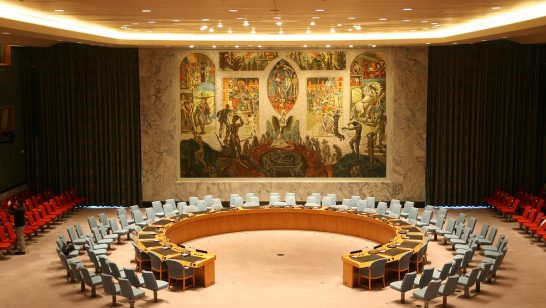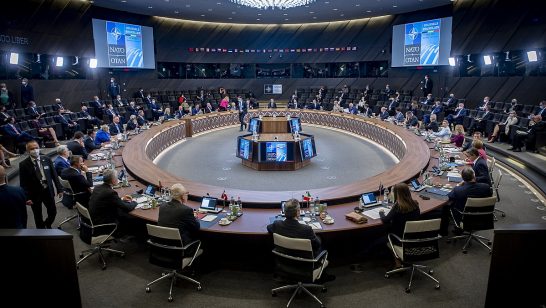
Within days of Russia invading Ukraine, the two sides started negotiations on a possible political settlement. These negotiations have been difficult to assess, as they are conducted with little transparency and both sides’ public messaging has been erratic. Europe and the US should follow their own foreign policy doctrines and long-term best practices: supporting the peaceful settlement of conflicts as a matter of principle and priority, and applying lessons learned on how negotiations and peace processes succeed. In particular, the EU should heed its commitment that women must participate and lead in peace processes; so far none have been seen in the press photographs of the Russian or Ukrainian delegations or been reported anywhere.
Western public discourse on the war in Ukraine is gripped by talk of victory, defeat and punishment, as if we had collectively forgotten that virtually all wars end through negotiated peace deals. Initially, Western states seemed only aloof towards the bilateral negotiations and mediation efforts by third parties like Turkey and Israel. It has since become increasingly clear that they are making the negotiations more difficult for Ukraine. Many Western officials have dismissed the prospects for a negotiated peace deal, with some of them preferring to “bleed Russia dry” or calling for the war to be won on the battlefield. Those opposing negotiations also argue that a settlement would reward a war of aggression, that Russia is not taking the ongoing negotiations seriously or that Russian rhetoric, including about Ukrainian statehood, indicates that Russia is no longer a rational actor.
This approach appears oblivious to the historic record of peace negotiations as well as the practice of diplomacy. It is also problematic, because Europe and the US have become stakeholders in this war and any eventual settlement, by providing weapons to Ukraine and imposing unprecedented sanctions on Russia. When Western officials oppose lifting sanctions on Russia although a peace deal might depend on it, or feign surprise at Ukraine’s requests for security guarantees while snubbing consultations to find solutions, they are essentially telling Ukraine it must keep fighting, even once it is no longer in its interest.
Preparing the ground for a negotiated way out
Negotiations and continued fighting are not mutually exclusive, as this war and other recent conflicts (Syria, Colombia, Bosnia etc) have shown. Talks may start with ceasefires, but they just as often do not, and they rarely produce comprehensive and stable political settlements swiftly. Precisely because such processes are non-linear, prone to setbacks and require months or even longer to accrue the necessary confidence and hammer out complicated arrangements, they should be launched as early as possible and invested in. The groundwork – competent delegations, a baseline of trust between them, dedicated third-party mediators, a detailed grasp of positions and proposals, buy-in from all stakeholders – needs to be laid early so that it is ready when the moment for a deal (e.g. a military stalemate) arrives.
While Western officials vacillate over whether Ukraine should negotiate with Russia at all, that point is moot, because the two sides have been negotiating since February 28. Indeed, around the time of a two-day meeting in Turkey in late March, the negotiations were intensive and substantive, evidenced by the gradual adjustment of the respective positions and beginnings of creative problem-solving. This points to both sides realizing that neither can win decisively in the field and that a negotiated settlement is inevitable and may be in their best interest.
Even as evidence of large-scale war crimes is casting a shadow on the talks, President Zelensky has stated that he will continue to seek a diplomatic solution, saying “You can’t fight for dust when there is nothing and no people. That’s why it is important to stop this war”. The bitter lot of peacemakers is that they must, in the words of Yitzhak Rabin, make peace with their enemies and very unsavory ones at that. At the time of the final edit of this text, Ukraine and Russia have once again reaffirmed their commitment to talks.
But these negotiations have been hardly state of the art. They appear disjointed, have skipped the usual sequence of confidence-building measures, and the lack of sustained good offices and competent technical support is showing. With an all-male cast of negotiators on both sides, the delegations are not appropriately representative of the nations they speak for.
Instead of showing a cold shoulder or deciding what’s best for Ukraine, Europe should respect Ukraine’s choice to conduct talks, offer political and technical support and engage in good faith on those points in which they hold stakes. For example, in the framework of an interactive negotiation process and in close consultation with their Ukrainian counterparts, Western countries should set out the conditions under which they would lift (at least some) sanctions. This would be in line with their professed goal of ensuring Ukraine’s survival and recovery.
Only when European states participate constructively in the peace talks can they contribute their expertise and help the negotiations become more stable, focused and productive. As part of their best practices, they should promote the equal and empowered inclusion of women in the talks.
Women’s inclusion is not a luxury
In 2000, the UN Security Council adopted resolution 1325, which codified something that peacemakers had long understood: women’s equal participation, full involvement and increased role in decision-making make a critical positive difference in matters of peace and security.
The resulting Women, Peace and Security agenda holds that women must play a meaningful role in peace negotiations, rendering settlements more durable and more conducive to justice, human security and democratic development. This is not some feminist fairy tale but is backed by large-scale quantitative studies of dozens of conflicts. In our patriarchal, deeply gendered societies, men and women play different roles and hold different status, and consequently women acquire a different understanding of needs in their community and different skills for navigating and negotiating the world around them.
Women experience armed conflict differently, and their leadership and agency are perceived differently from men’s. Over the course of lifetimes lived with gendered roles and responsibilities, women learn how to build trust and facilitate dialogue, reach out to others, find common ground and moderate extremism. Besides knowledge, women leaders’ record of service in their communities means they have authority and constituencies, which helps with implementing peace agreements.
Women in Ukraine have expert understanding of what a settlement would have to look like so that everyone can enjoy the fruits of peace. Almut Rochowanski
The Women, Peace and Security agenda, more than most ideas generated by the UN, has become mainstream consensus among high-level policy-makers (albeit more in word than deed) as well as grass-roots peacebuilders. Since 2014, a growing number of countries, starting with Sweden and most recently Germany, have adopted a feminist foreign policy, which encompasses a commitment to women’s equal participation in peace processes. However, they failed to apply this framework to the war in the Donbas from 2014, and they perpetuate and escalate this failure in the current war by denying their support to the negotiations process and foregoing a chance to make it more participatory and stronger.
Ukrainian women activists share Zelensky’s outlook on the moral imperative of negotiating. “Did you see what happened in Bucha and Mariupol?” Anya, a deeply patriotic activist who has dedicated her life to supporting Ukraine’s army and military families, asked me. “We understand that every day the war goes on, our people will be killed like that. This has to stop, and that’s why we support these negotiations.”
Women in Ukraine have expert understanding of what a settlement would have to look like so that everyone can enjoy the fruits of peace. For example, from the start of the war in the Donbas in 2014, Ukrainian women activists took the lead on meeting the mental health and reintegration needs of veterans. They had to, because veterans were returning to families and communities with trauma, injuries and socio-economic dislocation (and often guns in their bags), and the government’s response was ill-informed and inadequate. All over Ukraine, women created sophisticated, integrated, community-based services of psychological support, family and group counselling, lobbied for government benefits and job placement for veterans and protected women and children from the rise in domestic violence.
Anya is one of these innovators and leaders. She and I talked about how Roman Abramovich, the sanctioned Russian oligarch, turned up at the negotiations without anyone quite knowing why. “It’s disgusting”, Anya said. “Abramovich knows nothing about Ukrainians’ needs and sits at the negotiations only to look out for his own interests. We, on the other hand, know everything about Ukrainians’ needs and would work hard for them. We should be screaming at the world that there must be women at these talks.” I asked Anya, what if someone invited her to join the peace talks? “Of course I would go. I would do everything for my country.”
If European leaders want to help end this war and build a just peace and prosperous future for Ukraine, they must support peace talks and engage constructively and in good faith. In line with global best practices and their own official policies, they should use their leverage so that Anya and women leaders like her have a seat at the table.
The opinions articulated above represent the views of the author(s) and do not necessarily reflect the position of the European Leadership Network or any of its members. The ELN’s aim is to encourage debates that will help develop Europe’s capacity to address the pressing foreign, defence, and security policy challenges of our time.
Image: Flickr, President of Ukraine



